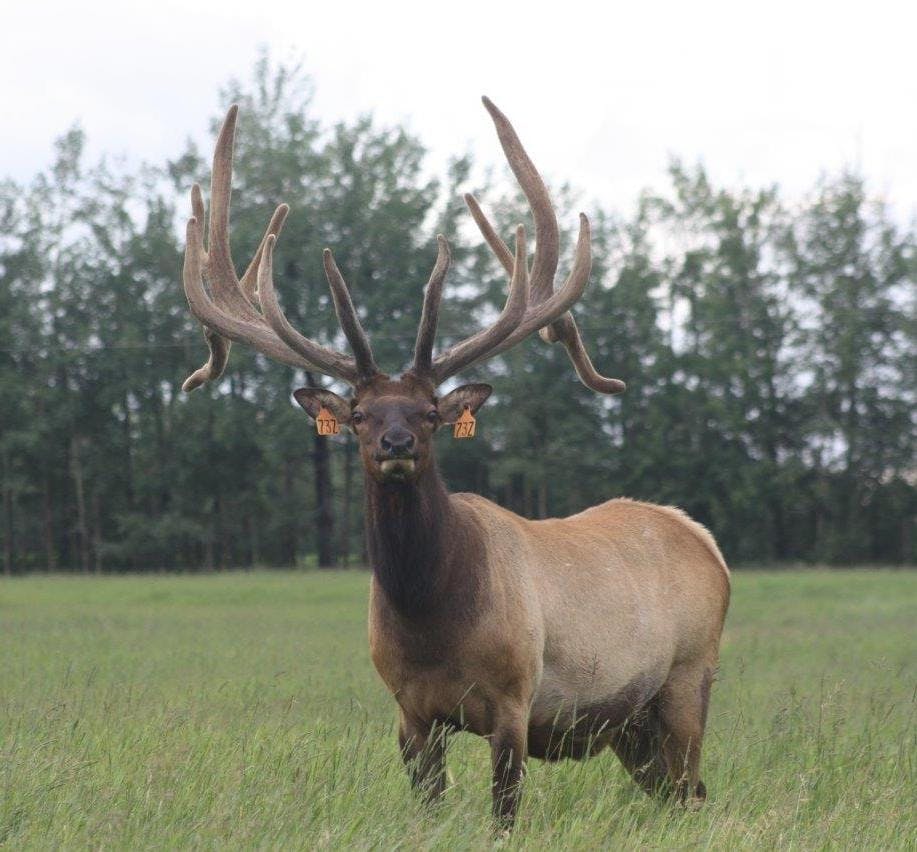CWD is a fatal disease affecting cervids – animal members of the deer family, such as deer, elk, moose, and caribou – and is a fatal prion disease like bovine spongiform encephalitis (BSE) in cattle. Currently, there is no known transmission of the disease to humans.
The disease was first detected in Canada in Saskatchewan in 1996, spreading to Alberta in 2005. To date, CWD has been detected in cervid animals across the four Prairie provinces, and in late 2021 Saskatchewan reported that up to 70% of male deer in the South Saskatchewan River basin were infected.
Without being treated or managed, CWD fatally reduces the overall populations of cervid animals, and infected animals can further introduce the disease into their environments.
“By advancing CWD research we will build our knowledge of how this disease spreads and the interaction between CWD and vegetation and across wildlife species. Understanding how CWD can be transmitted through vegetation and potentially through other animals will inform science-based strategies to limit the prevalence and spread of CWD in wildlife populations in Alberta and beyond." — Clinton Dobson, RDAR Director of Research
To help combat this disease, RDAR will provide $458,850 to Dr. Judd. Aiken at the University of Alberta to support his research on CWD and its impact on crops. CWD affects not only wild cervid populations but also agriculture and associated economies. Today, CWD directly impacts Alberta’s deer and elk farming industries; in the future CWD may affect exports of products such as hay, as some countries have already banned hay imports from CWD endemic areas.
Additionally, to understand how CWD spreads, RDAR will provide $62,500 to Dr. Sabine Gilch at the University of Calgary to research CWD transmission in sympatric (co-located) species. Her research will investigate whether non-cervid species such as mice, voles, ferrets, and felines are susceptible to infection with CWD. Her research will further investigate the transmissibility of CWD to economically important species such as cattle and pigs and assess the risk CWD poses to agriculture, crop industry and public health.
“Our commitment to CWD research is good news for producers, this prion disease has debilitated the farmed cervid and hunting sectors for many years and now represents a major threat to Alberta agriculture. The threat of crop contamination with CWD prions shed by cervids is real. The work of researchers’ is essential to understanding the disease and developing countermeasures. And I am confident in Alberta’s capacity to develop effective disease solutions based on vaccines and genomics.“ — Dr. David Chalack, DVM RDAR Chair
These two crucial RDAR -supported research projects will complement three additional CWD research projects funded by Alberta Innovates and the Ministry of Environment and Parks. Research funding support leveraged from all organizations will total over $2 million.
| Principal Investigator | Alberta Innovates Support | Project Title |
|---|---|---|
| Principal InvestigatorJudd Aiken University of Alberta | Alberta Innovates Support$248,000 | Project TitleCWD contamination of vegetation |
| Principal InvestigatorSabine Gilch University of Calgary | Alberta Innovates Support$249,500 | Project TitleChronic wasting disease transmission to sympatric species |
| Principal InvestigatorHolger Wille University of Alberta | Alberta Innovates Support$250,000 | Project TitleStructure-based chronic wasting disease vaccines: Analyzing their mode of action |
| Principal InvestigatorDebbie McKenzie University of Alberta | Alberta Innovates Support$250,000 | Project TitleMechanisms of genetic resistance to CWD infection in white-tailed deer and caribou |
| Principal InvestigatorHermann Schätzl University of Calgary | Alberta Innovates Support$250,000 | Project TitleCombining vaccination with genetic resistance to protect caribou against chronic wasting disease |
| Table supplied be Alberta Innovates | ||
Alberta monitors CWD more extensively than any other jurisdiction. Through partnerships between government, post-secondary institutions, and producers, RDAR can generate innovations that benefit people, plants, animals, and the environment. We are proud to support this CWD research and are optimistic that these projects will make significant strides in providing new knowledge and management options for controlling CWD in cervid populations.
RDAR’s funding contributions – of which $377,128 comes from the Canadian Agricultural Partnership (CAP) – are valued at $521,000 over 24 months.
Quick Facts:
CWD is a prion disease caused by misfolded prion proteins in the brains of cervid animals.
In addition to threatening health, CWD also threatens food sources, e.g., First Nations’ traditional foods, livestock, and crops, as well as other sectors, e.g., hunting, trapping, and tourism (outfitters).
Alberta Health, Health Canada and the World Health Organizations all advise that any deer harvested in a jurisdiction affected by CWD be tested for the disease and, if positive, that the animal not be consumed.
The positivity rate in hunted mule deer tested in Alberta is nearly 15 percent (2021) and is increasing.
About the Canadian Agricultural Partnership
The Canadian Agricultural Partnership is a five-year, $3 billion investment by Canada’s federal, provincial, and territorial governments to strengthen and grow Canada’s agri-food and agri-products sectors. This commitment includes $2 billion for programs cost-shared by the federal and provincial/territorial governments, with the programs designed and delivered by provinces and territories.
About RDAR
RDAR is a not-for-profit organization that will continually consult with Alberta’s crop and livestock producers to set research priorities and distribute funds. Its mandate is: to support results-driven agriculture research priorities and programs that will increase the competitiveness and profitability of Alberta’s agriculture industry. Arm’s length from the provincial government, RDAR is funded by two sources: The Government of Alberta, the Government of Canada, and Alberta’s Government through the Canadian Agricultural Partnership program. rdar.ca
Alberta Innovates
Alberta Innovates is the province’s largest and Canada’s first provincial research and innovation agency. For a century, we have worked closely with researchers, companies, and entrepreneurs – trailblazers who built industries and strengthened communities. Today we are pivoting to the next frontier of opportunity in Alberta and worldwide by driving emerging technologies across sectors. We are a provincial corporation delivering seed funding, business advice, applied research and technical services, and avenues for partnership and collaboration. Learn how albertainnovates.ca
